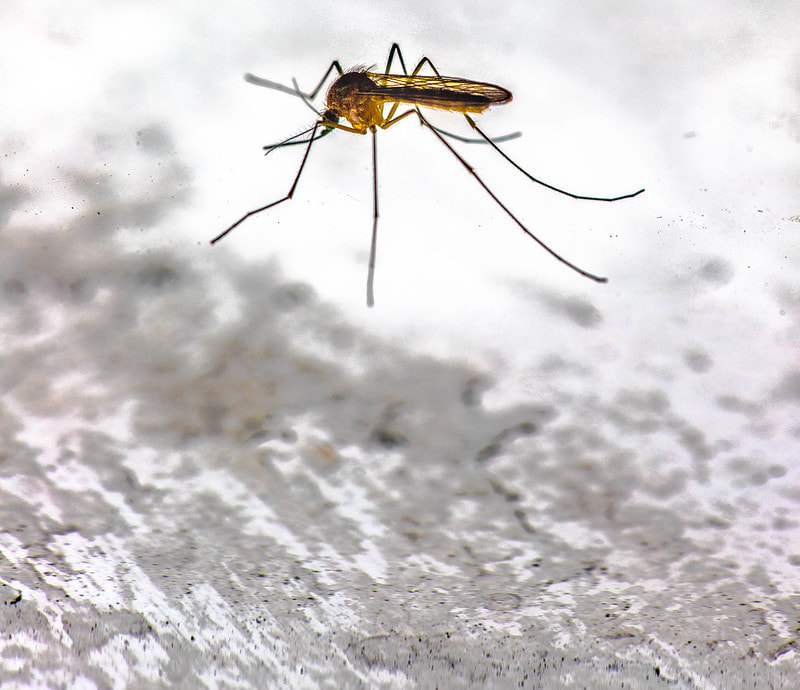In order to combat disease-carrying mosquito populations, Florida is releasing hundreds of millions of genetically-modified mosquitoes into the Florida Keys.-- Margaret, 11th Grade
In order to combat disease-carrying mosquito populations, Florida is releasing hundreds of millions of genetically-modified mosquitoes into the Florida Keys. Florida’s Mosquito Board has addressed the problem of mosquitoes carrying Zika virus and dengue fever, among other dangerous illnesses, by creating a new species of genetically-modified mosquitoes that carry a “lethal gene.” When present in female mosquitoes, this gene will not allow the mosquitoes to produce essential proteins, killing them. Male mosquitoes are not affected by the gene, allowing them to spread the gene throughout the population. Since females are the only mosquitoes that drink blood in order to produce eggs, the entire population of invasive mosquitoes could die out.
This is not the first time this strategy has been used. In places like the Cayman Islands, Panama, and Brazil, there have been high success rates. In some places, like, in an urban area of Brazil, it has been reported that mosquito populations have reduced by as much as 95%. However, this is not always the outcome of the strategy. In Jacobina, Brazil, the genetically modified mosquitoes were released only for the scientists to discover that the lethal gene was not powerful enough to kill the females before they mated, and the resulting hybrid mosquitoes actually strengthened the population.
The need for a solution to the mosquito problem is definitely real. Although there have not been any cases of the Zika Virus so far in 2020, Florida is the only US state with examples of locally spread cases of Dengue Fever in 2020 (21 cases) and one of the only US states with cases of the West Nile Virus in 2020 (9 cases). Mosquito borne illnesses are dangerous and can create pandemics like the 2015-2017 Zika Virus pandemic. Stopping the spread of these illnesses is crucial, but the technique is experimental.
Not everybody in Florida is on board with the idea, and groups such as the Center for Food Safety and Florida Keys Environmental Coalition are pushing back against it. Some residents are not happy that this is how their state is spending their money. Jaydee Hanson, policy director for the International Center for Technology Assessment and Center for Food Safety gave a statement for the Center for Food Safety saying, “With all the urgent crises facing our nation and the State of Florida-—the Covid-19 pandemic, racial injustice, climate change—the administration has used tax dollars and government resources for a Jurassic Park experiment.”
According to residents of Florida, many thought the plan was satire. It seems ridiculous that the state would be really implementing this plan. It also seems that there are more pressing issues that the state has to face: for example, the struggling school system. Mosquitoes are an annoyance and discomfort to the residents, but rarely does that annoyance become more relevant than things like the school system and the preservation of the natural environment.
All of this begs the question: how far can human interference with the natural world go before it’s inhumane? Science fiction movies like Jurassic Park and others warn us of catastrophic, dramatic results, but in reality, failures lead to worsening of situations. Zika virus is a very real problem, and the intervention of humans to try to change the genetics of the mosquitoes could worsen it. How much of the push back against this new mosquito experiment stems from a small-minded fear of scientific progress, and how much is well founded? Many are asking, If a precedent is set for human intervention, what else can it extend to? How long will it be until we see other kinds of genetically modified animals wandering around nature? And is this inherently wrong?
Florida has already set aside a budget of one million dollars a year to be spent on mosquito control. They are taking other, more conventional measures to control the bugs, such as spraying insecticides over heavily populated areas. There doesn’t seem to be any right way to approach this problem, but during the Covid-19 pandemic, when so many people are in desperate need of state assistance, and during this time of intense political upheaval, the millions of dollars being spilled into mosquito control seem almost insulting. As economic relief from Covid-19 slows down, more and more businesses are laying off employees, leaving the state with an 11.3% unemployment rate, 1% more than the rates in June.
Still, the experiment will not be thwarted, and despite the outcry of residents and organizations alike, Florida is set to release almost 750 million mosquitoes in 2021. Only time will tell whether this will be a worthwhile investment when money matters so much or whether it will only serve to strengthen the preexisting population of invasive mosquitoes.


